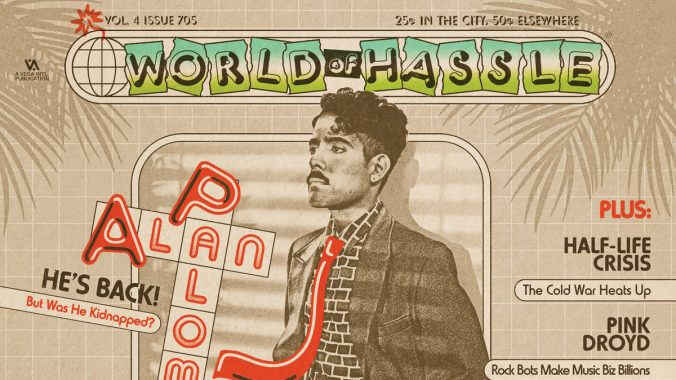Alan Palomo Invites Us Into His Dazzling World of Hassle
The Neon Indian frontman’s first solo album is a gorgeous, cinematic fusion of R&B, disco and yacht rock that plays with ‘80s music tropes to captivating effect

Before bedroom pop—that strain of fuzzy, vibe-y, DIY music you hear a lot on Tik Tok and SoundCloud—there was chillwave. Emerging in the early 2010s, chillwave was borne out of the fruitful indie sleaze era, known for its blend of the lo-fi, dreamy psychedelia of the ‘70s and the seductive, upbeat synths of the ‘80s. Alan Palomo—and his electro-pop project Neon Indian—was, arguably, the most prominent contributor to that movement, producing three uniformly strong records—2009’s Psychic Chasms, 2011’s Era Extraña, and 2015’s VEGA INTL. Night School—that played a crucial role in cementing the internet’s impact on pop music.
Neon Indian, in particular, stood out for the way Palomo and his team hit the sweet spot between retro and futuristic—filtering the blissed-out sounds of the past through a lens of ambient millennial angst in the digital age. Songs like “Deadbeat Summer,” “Polish Girl” and “Annie” were catchy, escapist balms in the anxiety-inducing, post-recession landscape that simultaneously recalled the musical textures of artists like Todd Rundgren, Depeche Mode and Carly Simon.
But, like many music trends, chillwave came and went, with bedroom pop taking its place and furthering the democratization of music-making for better or worse. Palomo has also stayed relatively mum since the subgenre’s decline, having made a few one-off singles in the past few years but no major body of work. Now, nearly a decade since his last full-length output, Palomo has returned with his first explicitly solo record World of Hassle—with only two of his Neon Indian bandmates helping out behind the scenes. Though the album is less chillwave and more vaporwave (another trendy online micro-genre), Palomo has crafted something much more ambitious and refined than a simple “aesthetic,” doubling down on the comforting sonic nostalgia of his earlier efforts but infusing it with his fresh, charismatic twisting of older styles.
World of Hassle is a richly crystallized marriage of Palomo’s vision and technique, an electric fusion of woozy disco, sensual R&B, and funky yacht rock. The production is razor-sharp in its precision, the lyrics carry an air of looseness and levity and the world-building of its central concept is evocative enough to offset how well-worn ‘80s throwbacks have become in today’s pop culture. Think of it like an alternative soundtrack to Miami Vice or a less hedonistic, more romantic companion to The Weeknd’s After Hours. In contrast to Abel Tesfaye’s revenge-seeking anti-hero, Palomo poses as a lovable, lovesick nightclub entertainer who stuffs his big-hearted emotions—and even bigger sounds—into a tasty, sensuous elixir that you can’t get enough of.
Some may find World of Hassle overly indulgent in its cinematic, Grand Theft Auto-like presentation—you could practically play this album front-to-back while crashing into virtual cars and visiting seedy, late-night establishments on your TV—but its excess is part of the fun. The record is gorgeous and transportive, bursting with a savory international flavor that spans from Japanese city pop to reggae, the Italo disco of Giorgio Moroder to I’m Your Man-era Leonard Cohen and vocals that flit between English, Spanish, and French.
-

-

-

-

-

-

-

-

-

-

-

-

-

-

-

-

-

-

-

-

-

-

-

-

-

-

-

-

-

-

-

-

-

-

-

-

-

-

-

-








































